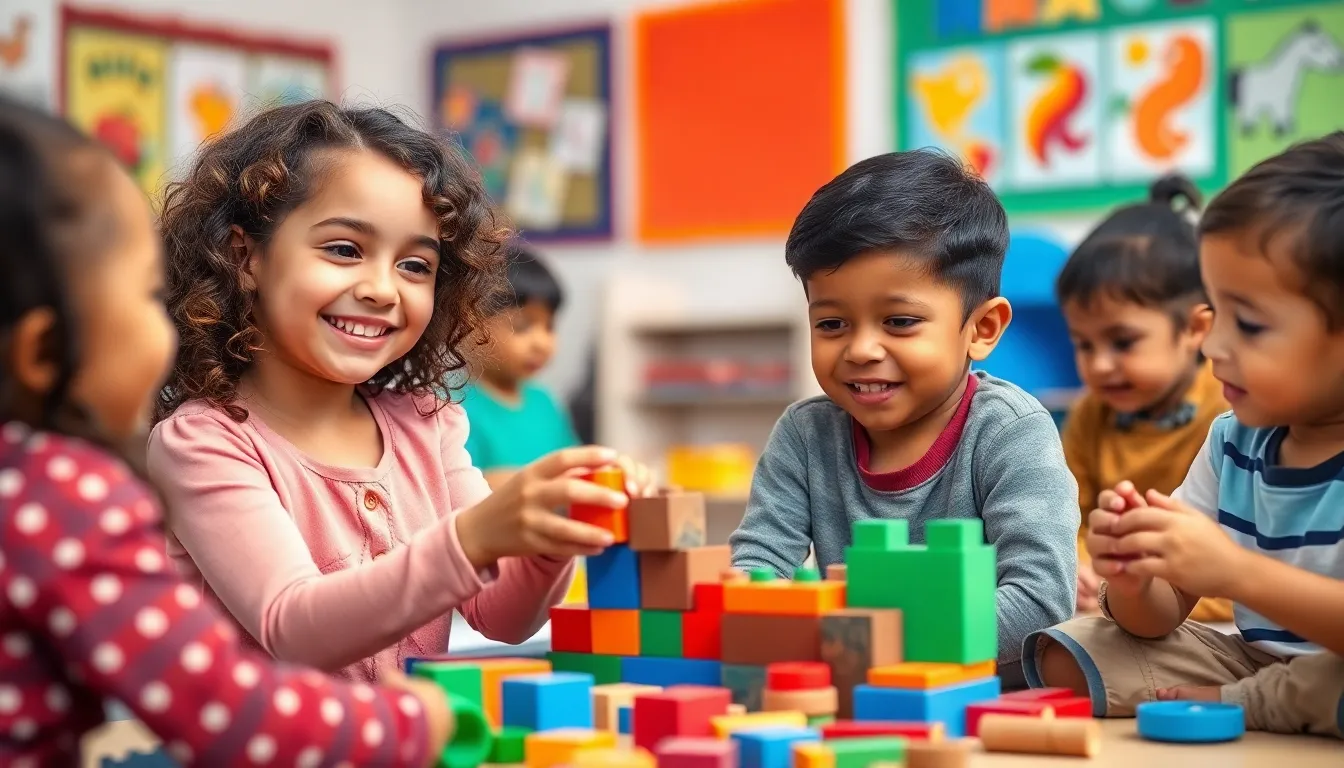Table of Contents
ToggleIn a world where tiny tots wield crayons like swords and glue sticks become their best friends, the preschool curriculum stands as the unsung hero of early education. It’s not just about learning the ABCs and 123s; it’s a magical journey where playtime meets learning in a delightful dance. Imagine a place where children explore their creativity while mastering the art of sharing, all under the watchful eye of a dedicated teacher who’s part educator, part magician.
Overview Of Preschool Curriculum
Preschool curriculum focuses on holistic development through a combination of play and structured learning. The curriculum incorporates various areas, such as language development, cognitive skills, social-emotional growth, and physical development. Each activity aims to nurture a child’s curiosity and creativity, making learning enjoyable and effective.
Language development includes storytelling, singing, and early literacy activities. Children practice communication skills and enhance vocabulary through interactive experiences. These activities encourage expressive language while promoting listening skills.
Cognitive skills receive attention through problem-solving activities and hands-on projects. Children engage in puzzles, sorting games, and science experiments that stimulate critical thinking. These experiences are essential for fostering an inquisitive mindset.
Social-emotional growth occurs through cooperative play and group activities. Children learn to share, take turns, and communicate their feelings. Moreover, they develop empathy and understanding of relationships, essential qualities for future interactions.
Physical development focuses on both fine and gross motor skills. Activities like cutting with scissors, drawing, and engaging in outdoor play promote physical health. These exercises improve coordination and help develop a child’s motor proficiency.
Educators play a pivotal role in implementing a successful curriculum. They assess each child’s progress and tailor activities to suit individual needs. Guidance from teachers ensures that learning objectives align with developmental milestones.
The preschool curriculum integrates various elements that support comprehensive growth. By blending learning with play, it cultivates a nurturing environment where children flourish socially, emotionally, and academically.
Importance Of Early Childhood Education

Early childhood education plays a crucial role in shaping a child’s future. This foundational stage sets the groundwork for lifelong learning and personal development.
Cognitive Development
Cognitive skills develop significantly during preschool years. Children engage in activities that stimulate thinking and problem-solving abilities. Storytelling enhances language and vocabulary, making communication more effective. Engaging in hands-on projects encourages exploration, leading to higher cognitive function. Critical thinking skills form as children learn to navigate challenges through guided activities. Educators monitor progress, ensuring each child’s intellectual growth aligns with developmental milestones. Such tailored experiences foster an environment where cognitive development thrives.
Social Skills
Social skills gain importance in preschool settings. Children learn to interact with peers in cooperative play, which fosters sharing and empathy. Participating in group activities helps develop essential teamwork and conflict resolution skills. Teachers guide social interactions, providing support as children practice building relationships. Encouraging teamwork enhances communication and enables children to understand different perspectives. This social engagement contributes to emotional intelligence, which is vital for personal development. Through these interactions, children develop confidence in their social capabilities, preparing them for future experiences.
Types Of Preschool Curriculums
Preschool curriculums vary widely, each designed to meet children’s developmental needs and learning styles. Here’s a look at several prominent types:
Montessori Approach
The Montessori approach emphasizes child-led learning. Children choose activities that interest them, promoting independence and self-direction. Mixed-age classrooms encourage peer learning, fostering collaboration and social skills. Hands-on materials engage children through exploration and experimentation. Each child works at their own pace, reinforcing concentration and problem-solving abilities. This method supports holistic development, integrating cognitive, social, and emotional growth effectively.
Reggio Emilia Approach
The Reggio Emilia approach values child expression and creativity. Teachers observe and document children’s interactions and interests, using this information to create relevant projects. Art and creative expression play a central role, allowing children to communicate their ideas. Collaboration between children, families, and educators fosters a strong community. A focus on environmental design enriches the learning space, promoting exploration and inquiry. This curriculum nurtures critical thinking and encourages children to explore their world deeply.
HighScope Curriculum
The HighScope curriculum focuses on active learning through hands-on experiences. Children engage in plan-do-review cycles, choosing what they want to learn and reflecting on their activities. Daily routines provide structure while allowing flexibility. Teachers facilitate learning by forming supportive relationships and guiding exploration. The curriculum also integrates key developmental areas, including social-emotional, physical, and cognitive skills. Regular assessments track progress, ensuring each child reaches their developmental milestones.
Key Components Of An Effective Preschool Curriculum
An effective preschool curriculum emphasizes various key components that enhance a child’s early learning experience. Each element contributes to holistic development, fostering growth in multiple areas.
Play-Based Learning
Play-based learning serves as a foundation for preschool education. Through play, children explore new concepts and ideas, absorbing information naturally. Activities like games, imaginative play, and creative projects encourage problem-solving skills and critical thinking. Children express themselves freely in a playful environment, which promotes language development and social interaction. Engaging in group activities nurtures teamwork and communication skills. Play also allows children to practice emotional regulation, as they navigate various social situations. Ultimately, play transforms learning into an enjoyable experience.
Structure And Routine
Structure and routine provide a sense of security for preschoolers. Establishing a consistent daily schedule helps children understand expectations, which reduces anxiety about transitions. Activities may include circle time, storytelling, and free play, ensuring that children have a balanced experience. Each part of the day reinforces learning objectives while accommodating individual needs. Predictable routines facilitate positive behavior and enhance focus, allowing educators to monitor progress effectively. Building routines also fosters independence as children learn to manage time and transitions on their own.
Inclusion Of Parents
Inclusion of parents enhances the preschool curriculum significantly. Parents play a vital role in their child’s education and development. Open communication between educators and families fosters a collaborative environment. Regular updates on progress and gatherings create opportunities for parental involvement. Workshops and activities encourage parents to engage with the curriculum actively. Inviting parents to share their skills or cultures enriches the learning experience for all children. Partnership between families and educators cultivates trust, strengthening the educational journey for every child.
A well-structured preschool curriculum lays the foundation for a child’s future success. By blending play and learning, it nurtures essential skills that go beyond academics. Children develop critical thinking, social abilities, and emotional intelligence in a supportive environment.
The diverse approaches to preschool education cater to individual learning styles, ensuring each child thrives. Whether through Montessori, Reggio Emilia, or HighScope, the focus remains on holistic development.
Parental involvement further enriches this experience, creating a collaborative atmosphere that benefits everyone. Investing in a comprehensive preschool curriculum is investing in a child’s lifelong journey of learning and growth.




